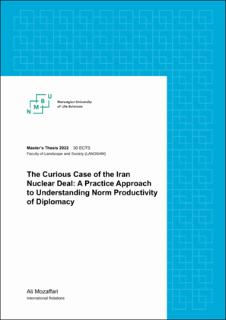| dc.description.abstract | Iran’s nuclear programme has long been a nuclear proliferation controversy. In 2015, a historic agreement, the Joint Comprehensive Plan of Action (JCPOA), was achieved that addressed the international community’s concerns about Iran’s nuclear programme. In 2018, however, the US pulled out of JCPOA. Much to the surprise of many, JCPOA did not immediately fall apart. In fact, JCPOA persisted for quite a long time. I made a hypothetical distinction between JCPOA as a material agreement, and JCPOA as a norm to explain the unexpected survival of JCPOA. In order to substantiate my claim, I foregrounded the role of diplomacy in the production and reproduction of JCPOA as a norm. I drew on post-structuralist and social constructivist elements as well as constructivist norm scholarship to inform my empirical analysis.
My empirical analysis comprised two main parts. In the first part, I focused on diplomatic practices that took place from 2015 to 2016 corresponding to the time JCPOA was achieved until the implementation day. I identified discursive traces in the diplomatic practices that could contribute to constructing JCPOA as a norm. In the second part, I identified the patterns in the diplomatic practices that were involved in the reproduction of JCPOA as a norm, even though the contestations were building up progressively during the second time span from 2017 to 2020.
I presented an innovative explanation for the surprising survival of JCPOA. I demonstrated that diplomatic practices were involved in the production and reproduction of JCPOA as a norm which in turn helped it persist against the contestations. I also uncovered a cooperative relationship between these diplomatic practices, and the structural/material factors in norm productivity.
The findings of this thesis provide empirical insights into understanding the constitutive and agentic capacity of diplomacy. This thesis supports the non-instrumentalist/critical view of diplomacy as opposed to the instrumentalist/rationalist view. It is concluded that diplomacy in itself can be consequential for world politics. | en_US |

